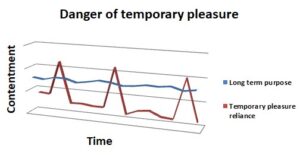Why pleasure is so dangerous
(≈9 min read)

Happiness is not just about ‘feeling good’. If this were the case, drug users and alcoholics would be among the happiest people on earth. There’s instead, a big difference between rooting your life on long term meaning and just surviving through the consistent pursuit of temporary pleasure.
Before addressing how you might go about replacing pleasure with deeper meaning, it’s important to first better understand why, to some degree, pleasure seeking is not totally your fault.
Why we gravitate towards temporary pleasure
As humans, our brains’ our biologically hardwired to choose the path of least resistance. If there’s a choice between short term pleasure and short term pain for long term gain, we’re designed to choose the pleasure. That means without habits, you’ll always be leaning towards the activities that ignite the most pleasure for the least effort.
We now live in what’s called a delayed-return environment which means that if you do something good today, it might take months, even years for these small victories to accumulate and produce the appropriate reward.
Think about going to the gym or producing a good piece of work for your boss or meditating. You won’t get healthy in a day. You won’t get that pay rise in a day. You won’t see the positive effects of meditation in a day.

The problem is our brains, through evolution, are adapted for an immediate return environment. Back when we were hunting, if we caught the prey, we got the food; almost every task was undertaken with instant gratification being the key motivator.
That means attempting to live our lives not reliant on temporary pleasure will require learning how to rewire our basic physiology. Sounds complicated, I know. That’s clearly not going to be something that can be achieved overnight; it’s going to require considerable time and effort.
The Happiness Gap
How many times have you heard someone say things like:
“If I had that new phone, I’d be happy.”
“If I were living in that huge house, I’d be happy.”
“If I got that Ferrari, I’d be happy.”
It’s a common misconception people hold that if they were able to just get X,Y or Z, all their worries would fade and instantaneous happiness would ensue. This might sound somewhat controversial, but if this is how you view happiness, you’ll always be fighting a losing battle.
There’ll always be a gap between what you have and what you want and this gap will make you unhappy. But that gap will never close. No matter how much you have, it’s human nature to always want more. The urge to want things doesn’t stop when you reach the things you previously wanted; you’ll just come up with new things you need.
That means, unless you can take a step back and remember that when you love what you have, you have everything you need, you’ll always be agonising over what you are missing that would make you happy. And in order to temporarily remove that agony you’ll revert to pleasure. But pleasure, as I’ll later discuss is not exactly a great long term solution.
It’s difficult to find meaning
If you were to walk up to any random stranger on the street and ask them what the meaning of their life is, you’d probably be greeted with a blank and bemused expression. Even if the stranger could get over thinking you’re clinically insane, actually answering that question would be super difficult.
Discovering what makes you tick, the reason you’re on this planet is a super tough question to answer. Later in the article, I’ll discuss strategies to help figure out different things you might find valuable that could give your life meaning, but for now I just want to highlight that the reason many of us stray towards short term pleasure is because we lack a deeper understanding of why we are here and what we want do in this brief time we have on Earth.
When there’s no clear reason to engage in that painful activity that might grow you, you simply won’t. That means that without a deeper meaning, impulsivity becomes more and more likely.
Life is suffering and pleasure offers a dangerous coping strategy
As the German philosopher Friedrich Nietzsche said:
“To live is to suffer, to survive is to find some meaning in the suffering.”
But without that meaning, we are left scrummaging for ways in order to sustain us when the storms of life hit.
Sadly, these ways are often based on temporary pleasure; pleasure that will inevitability fade and leave you with that same empty, vacuous feeling in your stomach.
At this point, you might be wondering whether for so many of us, this ‘life is suffering’ mentality is actually accurate.
Consider your average person who wakes up early, goes to work and comes back home. They don’t stop to think about the ‘why’, they’re instead content being enslaved to this time-draining, meaningless cause of helping another money thirsty individual rake in the profit.

They’re nothing but a number, a name on a piece of paper. To the company, they’re … (dramatic pause) nothing. And part of them knows that, part of them understands the purposelessness of their daily trials and this part of them needs to numb these feelings out; they’re simply too overbearing to consider. And so how does this numbing process occur?
Well, through temporary pleasure; drugs, alcohol, sex, food or any other thing you can think of that induces momentary relief.

Even beyond the daily meaningless job, the inevitability of death doesn’t help either. To know that every single person who gave you the best memories will soon become a memory, to know that every person you love will soon be gone forever, to know that everything you’ll ever achieve will soon be washed away as you fade into the cosmos and become nothing but a distant memory, to know all that and to live through it anyway is to guarantee suffering.
Look, this might be surprising to hear, but I’m telling you all this stuff to try and make you depressed. As Nietzsche points out, even with all this suffering there is still a way we can transcend it and live great lives, lives filled with meaning.
To cure the kind of emptiness your average person feels, they will typically engage in the temporary pleasure, whatever it might be, have their happiness levels soar up for a brief five minutes and then plummet back down into the dark, grimy depths of the empty void and repeat until death.
But that’s ok. Those five minutes make the subsequent suffering justified. They are just getting through life. And for some of us, that’s perfectly reasonable – getting through life is all we want.
But there are some people (like me), who think that rather than striving to survive, we should be striving to live.
Society makes pleasure difficult to resist
We live in a society where we’re encouraged almost every second of our waking life to be a consumer – bombarded with advertisements about products that could make our life just that little bit easier, products that more often than not can help induce temporary pleasure. Think about the things that have thrived in modern society – fast food, cigarettes, alcohol, pornography, betting stores.
These are all products that are based off that primordial urge we possess that encourages us to rush towards short term pleasure wherever possible. When we are presented with all these thousands of ways for us to indulge in short term pleasure every day, it makes it insanely difficult for us to resist.
Consumerism encourages us to behave and act based on unconscious energy such as lust, fear and immediate gratification in order for us to consume.
Society as it’s currently set up, therefore, makes it super hard for us to free ourselves from this trap and realise that immediate gratification is not the optimal solution for our future selves.
What’s the problem with living based off short term pleasure?
So far, I’ve discussed reasons why temporary pleasure seeking is virtually inevitable. But some of you might still be struggling to see what the problem with temporary pleasure even is. What’s wrong with having a quick drink and feeling good for a night?
Well, to put it simply, (and this is not some kinda trick) absolutely nothing.
The issue comes when that ‘feeling good for a night’ happens every night as your desire for a bigger and bigger rush starts to grow. The problem isn’t temporary pleasure itself but the risk of becoming reliant on temporary pleasure to keep you from descending into despair.
The danger of addiction
I discuss this in way more depth in my article on addiction but when we become overly reliant on short term pleasure to cover some kind of underlying trauma or pain, addiction is a probable outcome.
As physician Dr Gabor Maté puts it:
“Addiction is a response to emotional pain”

They say a bird trapped in a cage for a long time will prefer the cage to freedom. But with addiction, it’s even worse than this; after a short period of time, the initial rush you get from your addiction will likely not provide enough relief or pleasure for you anymore. You’ll want more. You’ll need more.
And so you’ll give yourself even more pleasure and as the pleasure escalates, so will the subsequent pain of regret. And how is this pain cured? Well…through pleasure. And then with the pleasure comes pain and to cure that pain you use pleasure…The cycle continues, and it’s super easy to become trapped in this struggle forever.
Temporary pleasure fades
Whatever activity it is you find pleasurable, it’s inevitable that soon you’ll no longer derive the same amount pleasure from that activity as you used to. You’ll get accustomed to it. You’ll need to move onto something else.

Imagine you buy a new car, a Ferrari say. For the first three weeks it’ll undoubtedly feel amazing, smooth and swift. But a month in, you’ll notice that you’re starting to forget about how beautiful it looks and how it feels to drive. As with everything new and initially amazing, you’ll become accustomed to it, it’ll lose its novelty. And then suddenly you’ll need something new.
What would happen if you ate your favourite food every day? Do you think it would be your favourite for very long? Or would you need to try something new, different?
Jumping from temporary pleasure to pleasure in order to keep you stable enough to continue functioning is arguably not a healthy lifestyle. The alternative, which I’ll discuss in more detail in a moment, is when you decide you want to live life based on deeper meaning. Here’s just a rough (admittedly pretty awful) graph I made to clarify what I’m on about.

You can see the difference in stability, in volatility, in emotional chaos. As soon as you make the active step to begin detaching yourself from all that simply serves to satiate your pleasure seeking self and instead allow that purpose, that meaning for your existence to infiltrate into everything you do, that’s when that contentment will begin to rise.
But how can we detach ourselves from temporary pleasure reliance, how can we ‘find our purpose’, as cliché and overused as that phrase sounds?
How to live a life based on meaning
As I’ve previously mentioned, when life is devoid from any kind of deeper meaning, it’s easy to fall into the trap of relying on short term pleasure to sustain us through suffering and pain. Another quote from the philosopher Nietzsche:
“He who has a why to live for can bear almost any how.”
The quote is discussed in quite some depth in Victor Frankl’s novel, “Man’s search for meaning” where he outlines how those in Nazi prison camps who had a reason to continue living, whether that be to see their children or wife or to finish their novel, were much more likely to survive than those who didn’t.
By establishing that true why, that ultimate noble goal, you have a reason to refrain from engaging in those fleeting pleasures you know will be detrimental to your future and also a reason to continue working and grinding in order to achieve the things in life you want to achieve.
As outlined in the graph earlier on, when you’re reliant on instant gratification, you are volatile, fragile. If life throws you a storm you’re much more likely to be knocked down and stay down compared to if you have that underlying purpose for your existence.
A relatively stable state of contentment is, in my eyes, much better than perpetually yo-yoing up into extreme bliss and then back down into emptiness and despair all the way until death.
So how can we figure out our purpose or purposes?
Finding your purpose
Victor Frankl’s ‘Man’s search for meaning’, opens by outlining a question he, as a psychiatrist would ask his patients. It’s an incredibly useful question that can be thought through by anyone.
“Why do you not commit suicide?”
Look, I know on the face of it, you might think I’m insane and that the question is just way too sinister and dark, but deep consideration of your answer can highlight what things in life you truly find meaningful and can provide a good starting point for establishing your passions.
For example, the most common response might be ‘my family’. In which case, you have highlighted something that gives your life meaning. But other things might include that novel you’re working on or your love for art or how much you love helping people.

Whatever your responses might be, everything you list is guaranteed to hold a significant amount of importance in your life. I know it sounds weird, but if doing art is a reason you don’t commit suicide then it’s important to you. You’ve established a passion.
Even after this however, it’s still perfectly possible that you’re just as lost, still unsure if you’ll ever find something you’re passionate about. And that’s totally fine.
What I’d recommend doing, especially when you’re young, is exposing yourself to as many different novel activities as possible. Try cooking and art and writing and sport and music and maths and anything else that you think there’s a slim chance you might enjoy. The more things you experience, the more likely you are to discover that one thing that you love more than anything.
Even if you’re old and are not sure what you are doing with your life, there is still time. Start trying things. Start experimenting before it’s too late.
But as I discuss in more detail in my article on finding your purpose, even if you still can’t find anything, it’s important to remember that sometimes the best things in life are things you never even planned for.
With these passions and purposes in mind, resisting short term gratification in order for a better long term future should become a whole lot easier.
Don’t view pleasure as good and pain as evil
A natural side effect of living life with the ‘pleasure is good’ mentality is avoiding pain at all costs.
A natural progression from ‘I need to feel good’ is ‘I must not feel bad’. This leads to something known as experiential avoidance where your primary goal is to simply avoid all potential painful feelings. This mind-set however is actually super damaging and strips you not just of pain but also of joy.
Often, things that you’re initially anxious about, you end up actually really enjoying and you never would have experienced that joy, if you’d have been completely discomfort avoidant. You can’t have love without fear of rejection. You can’t achieve great things without fear of failure. By removing the possibility of pain, you are simultaneously removing the possibility of joy.
Instead of living your life based on running away from anxiety and all these negative things that might arise, you should instead be looking to run towards the things you do want and learning to cope with those negative emotions along the way.
As opposed to chasing pleasure and avoiding pain, it’s important to realise that the two are intrinsically linked. Most of the best things in life require prior suffering. But that suffering, in the right form, is absolutely worth enduring.
To finish…
As I’ve constantly reiterated throughout the article, I personally believe that the key to living a good life is living a life based on deeper meaning. An interesting scenario to consider is this:
“If there came a time when you could take class A drugs and feel their effects all the time, because medicine had been invented to completely eradicate any after-effects, and you were rich enough to be able to afford these drugs forever, would your entire life consist of being ‘on drugs’, feeling this state of perpetual joy and lack of worry forever?”
I suppose the question, reframed, is something like, if it were possible, would you choose to be high forever?
Interestingly, in most cases, people answer no to this question. They enjoy the pleasure they experience temporarily but wouldn’t be willing to be in this state for the rest of their lives. I think that in itself highlights the value of true deep meaning in our lives. There is much more to life than simply chasing pleasure and avoiding pain.
As the author of ‘The Happiness Trap’, Russ Harris puts it:
“So here is the happiness trap in a nutshell: to find happiness, we try to avoid or get rid of bad feelings, but the harder we try, the more bad feelings we create.”
So my suggestion is this: find real purpose in your life and live your life in accordance with the things you find meaningful.
Short term pleasure is obviously a great thing and if there is no reliance on it and you know for a fact that you could give up that pleasure forever and be unaffected then great, indulge, have fun. But always remember that there is much more to life than simply pleasure.








